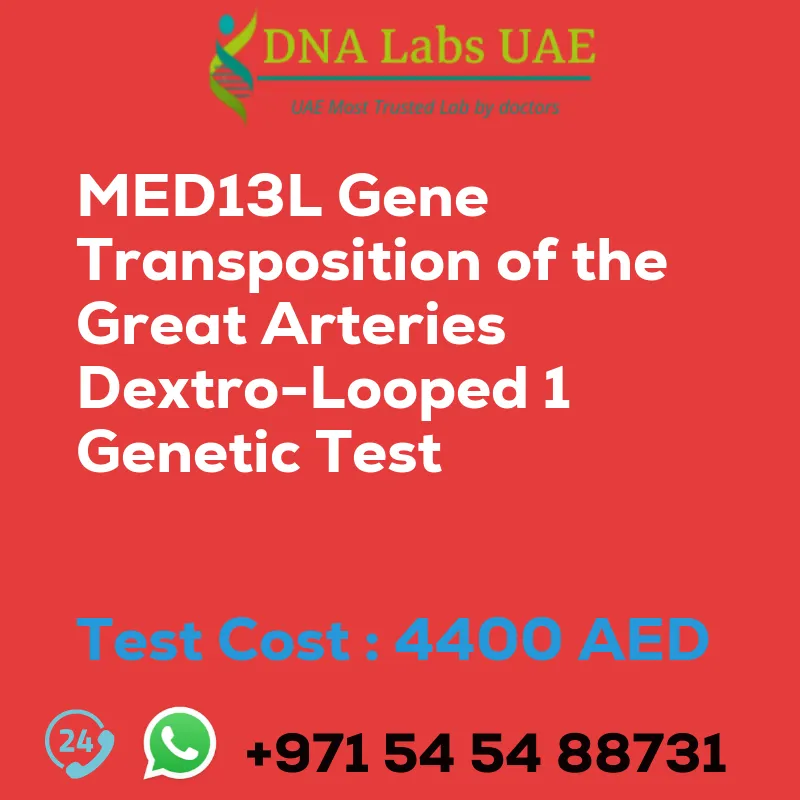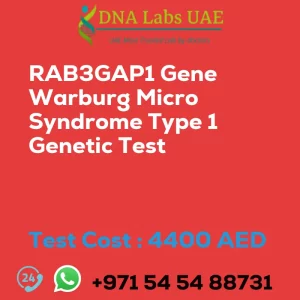MED13L Gene Transposition of the great arteries dextro-looped 1 Genetic Test
Test Name: MED13L Gene Transposition of the great arteries dextro-looped 1 Genetic Test
Components: Blood or Extracted DNA or One drop Blood on FTA Card
Price: 4400.0 AED
Report Delivery: 3 to 4 Weeks
Method: NGS Technology
Test type: Dysmorphology
Doctor: Pediatrics
Test Department: Genetics
Pre Test Information: Clinical History of Patient who is going for MED13L Gene Transposition of the great arteries, dextro-looped 1 NGS Genetic DNA Test. A Genetic Counselling session to draw a pedigree chart of family members affected with MED13L Gene Transposition of the great arteries, dextro-looped 1 NGS Genetic DNA Test gene MED13L
Test Details: The MED13L gene is a gene that provides instructions for making a protein called mediator complex subunit 13-like (MED13L). This protein is involved in regulating the activity of other genes, particularly those involved in the development and function of various organs and tissues. Transposition of the great arteries (TGA) is a congenital heart defect where the two main arteries that carry blood away from the heart, the pulmonary artery and the aorta, are switched in position. This can disrupt the normal flow of oxygenated blood to the body, leading to a variety of symptoms and complications. Dextro-looped 1 is a subtype of TGA where the aorta is positioned on the right side of the heart instead of the left side, and the pulmonary artery is positioned on the left side instead of the right side. NGS (Next-Generation Sequencing) genetic testing is a type of genetic test that uses advanced sequencing technologies to analyze multiple genes or even the entire genome at once. This allows for a comprehensive analysis of an individual’s genetic information and can help identify specific genetic variants or mutations that may be associated with a particular condition, such as TGA. In the context of TGA, a NGS genetic test targeting the MED13L gene may be used to identify any genetic variants or mutations within this gene that could potentially contribute to the development of dextro-looped 1 TGA. By identifying these genetic changes, healthcare professionals can gain a better understanding of the underlying causes of the condition and potentially develop more targeted treatment approaches in the future.
| Test Name | MED13L Gene Transposition of the great arteries dextro-looped 1 Genetic Test |
|---|---|
| Components | |
| Price | 4400.0 AED |
| Sample Condition | Blood or Extracted DNA or One drop Blood on FTA Card |
| Report Delivery | 3 to 4 Weeks |
| Method | NGS Technology |
| Test type | Dysmorphology |
| Doctor | Pediatrics |
| Test Department: | Genetics |
| Pre Test Information | Clinical History of Patient who is going for MED13L Gene Transposition of the great arteries, dextro-looped 1 NGS Genetic DNA Test. A Genetic Counselling session to draw a pedigree chart of family members affected with MED13L Gene Transposition of the great arteries, dextro-looped 1 NGS Genetic DNA Test gene MED13L |
| Test Details |
The MED13L gene is a gene that provides instructions for making a protein called mediator complex subunit 13-like (MED13L). This protein is involved in regulating the activity of other genes, particularly those involved in the development and function of various organs and tissues. Transposition of the great arteries (TGA) is a congenital heart defect where the two main arteries that carry blood away from the heart, the pulmonary artery and the aorta, are switched in position. This can disrupt the normal flow of oxygenated blood to the body, leading to a variety of symptoms and complications. Dextro-looped 1 is a subtype of TGA where the aorta is positioned on the right side of the heart instead of the left side, and the pulmonary artery is positioned on the left side instead of the right side. NGS (Next-Generation Sequencing) genetic testing is a type of genetic test that uses advanced sequencing technologies to analyze multiple genes or even the entire genome at once. This allows for a comprehensive analysis of an individual’s genetic information and can help identify specific genetic variants or mutations that may be associated with a particular condition, such as TGA. In the context of TGA, a NGS genetic test targeting the MED13L gene may be used to identify any genetic variants or mutations within this gene that could potentially contribute to the development of dextro-looped 1 TGA. By identifying these genetic changes, healthcare professionals can gain a better understanding of the underlying causes of the condition and potentially develop more targeted treatment approaches in the future. |








